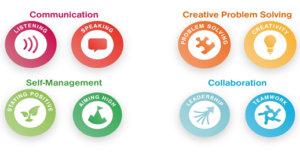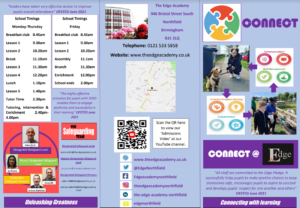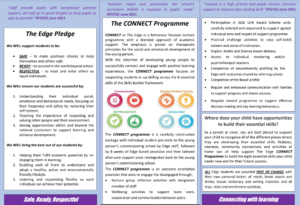Welcome to the CONNECT Programme.
This is a one term programme for Year 8 and Year 9 at The Edge Academy. We offer a behaviour focused nurture group with a blended approach of academic support. The emphasis is placed on therapeutic principles for the social and emotional development of the young person.
With the intention of developing young people to successfully connect and engage with positive learning experiences, the CONNECT programme focuses on supporting students in up-skilling across the eight essential skills of the Skills Builder framework.
 The CONNECT programme is a carefully constructed package with individual student pre-visits to the young person’s commissioning school by Edge staff, followed by Edge based provision and then tailored after-care support once reintegrated back to the young person’s commissioning school.
The CONNECT programme is a carefully constructed package with individual student pre-visits to the young person’s commissioning school by Edge staff, followed by Edge based provision and then tailored after-care support once reintegrated back to the young person’s commissioning school.
The CONNECT programme is an outcome orientated provision that aims to engage the disengaged through:
2 weeks preparation work prior to starting at Edge – to include admission pack completion, background information collection and consent paperwork for new cohort, home visit or school visit as appropriate by Edge staff to learner, discussion with home school contact, agreed individual aims and targets of support programme.
- 8 weeks of school-based provision at The Edge Academy. Full time school-based contact Monday-Friday with all food, refreshments, learning materials and resources, plus off-site opportunities provided for all young people on the programme.
Behaviour focused nurture programme with aspects of academic support. Emphasis on therapeutic principles for the social and emotional development of the young person.
2 consecutive weeks of outreach ‘aftercare’ at the commissioning school upon the student return to support transition and effective reintegration to mainstream.
Programme to be constructed of;
-
- Nurture group reflective activities with designated members of staff
- Participation in AQA Unit Award Scheme units carefully selected and sequenced to support agreed individual aims and targets of support programme to provide interactive and immediate tangible achievements and success https://www.aqa.org.uk/programmes/unit-award-scheme
- Wellbeing activities to support team work, cooperation and communication between peers.
- Practical challenge activities to raise self-belief, esteem and sense of motivation.
- Communication Literacy (English), Functional Numeracy (Maths) and STEM (Science) lesson delivery to maintain continuity with academic curriculum during time away from referring school setting.
- Access to individual mentoring and/or psychotherapist sessions.
- Regular and enhanced communication with families to support progress and share success.
- Bespoke reward programme to support effective decision making, key learning behaviours and essential personal skills.
- Completion of a selection of the following;
-
-
- Neurodiversity profiling by the Edge with outcomes shared to referring school. (Neurodiversity (ND) is an umbrella term and includes a ‘spectrum’ of conditions including Dyslexia, Dyscalculia, Dyspraxia (Developmental Coordination Disorder), Attention Deficit Hyperactivity Disorder, Autism Spectrum Disorder, and tic disorders including Tourette’s syndrome)
- Boxall profile (where possible in time frame of getting to know the learner) by the Edge with outcomes shared to referring school. (The Boxall Profile is a resource for the assessment of children and young people’s social, emotional and behavioural development. Many children in school are insecure about their worth, often not able to articulate their feelings. Instead, they show their discomfort by withdrawal, achieving much less than they could, not making good relationships)
- Mindfulness Attention Awareness Scale (MAAS)
- Mindset University Coaching Top 5 Values Assessment
- Revised Child Anxiety and Depression Scale (RCADS)
- School Engagement Risk Assessment Toolkit
-
The return to referring schools for each learner would therefore include resources to further support both the young person and the staff at school with an exit pack of a ‘Student Profile’ report on completion with suggested strategies, interventions, successes and things to avoid. The fully supported return of student back to school for the final weeks of the term is to allow for high-quality outreach after-care from Edge staff within the commissioning school setting is the most vital piece of the jigsaw. One of our intervention team would visit to the school the returning young person to support them in applying the support strategies trialled at the Edge to their mainstream setting.


